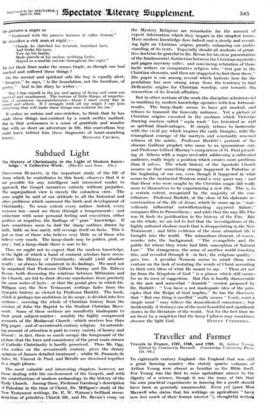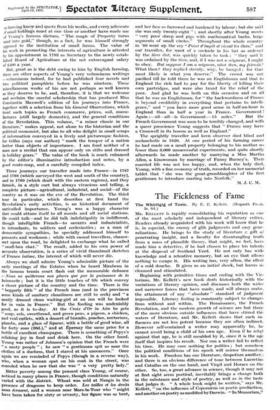Traveller and Farmer
To eighteenth century England—the England that was still
a great farming country—the stately quarto volumes Of Arthur Young were almost as familiar as the Bible itself.
For Young was the first to raise agriculture almost to the dignity of a science, though it was the irony of fate that his own practical experiments in farming for a profit should have been so generally unsuccessful. Even yet (pace Miss Maxwell who states that his writings on agriculture " has, now lost much of their former interest "), thoughtful writers
ma farming know and quote from his works, and every advocate 31* small holdings must at one time or another have made use of young's famous dictum, " The magic of Property turns sand into gold," though, as a fact, he was himself strongly opposed to the institution of small farms. The value of his work in promoting the interests of agriculture is attested by his appointment in 1798 as Secretary to the newly estab- lished Board of Agriculture at the not extravagant salary of 1400 a year.
But, great as is the debt owing to him by English farming, there are other aspects of Young's very voluminous writings —voluminous indeed, for he had published four novels and two political pamphlets before he was nineteen. These miscellaneous works of his are not perhaps so well known as they deserve to be, and, therefore, it is that we welcome and acclaim the careful scholarship that has produced Miss Constantia Maxwell's edition of his journeys into France, together with a selection from his General Observations, which treat such topics as French commerce, prices, soil, manu- factures (still largely domestic), and the general conditions of the Revolution. This volume, " a minor classic in our literature," makes appeal, not alone to the historian and the political economist, but also to all who delight in small scraps of information conveyed in a lively and picturesque fashion, for trifles (says our author) " mark the temper of a nation better than objects of importance. I am fond neither of a man nor a recital that can appear only on stilts and dressed in holiday gears." The value of the book is much enhanced by the editor's illuminative introduction and notes, by a good route-map, and a carefully compiled index.
Three journeys our traveller made into France—in 1787 and 1788 (which surveyed the west and south of the country), and in 1789 (which dealt with the eastern regions), and they furnish, in a style curt but always vivacious and telling, a complete picture—agricultural, industrial, and social—of the country as it was on the eve of the Revolution. The third tour in particular, which describes at first hand the Revolution's early activities, is an historical document of unrivalled importance. Young's was a happy character that could attune itself to all moods and all social stations. He could talk—and he did talk indefatigably in indifferent, though intelligible French—to savants and industrialists, to intendants, to soldiers and ecclesiastics ; as a man of democratic sympathies, he specially addressed himself to
peasants and workmen ; while with casual travellers, chance- met upon the road, he delighted to exchange what he called " snuff-box chat." The result, added to his own power of accurate observation, is a series of vivid thumbnail sketches of France intime, the interest of which will never die.
Always we shall admire Young's admirable picture of the early meetings of the Estates when he heard Mirabeau in the famous tennis court flash out the memorable defiance —Nous ne quitterons nos places que par la puissance de la balonnette ; but it is the little touches of life which convey a closer picture of the country and the time. There is the " beggarly filth " of the French inns (and in the provinces some kinds of sanitary cleanliness are still to seek) and " a neatly dressed clean waiting-girl at an inn will be looked for in vain in France." But the feeding was undeniably good, as it is to-day. At the Croix d'Or in Aire he gets " soup, eels, sweetbread, and green peas, a pigeon, a chicken, and veal cutlets, with a dessert of biscuits, peaches, nectarines, Plumbs, and a glass of liqueur, with a bottle of good wine, all for forty sous (20d.)," and at Epernay the same price for a bottle of excellent champagne. There is something of Pepys's relishing joy in food and drink here. On the other hand, Young was rather of Johnson's opinion that the French were " a nasty people " ; he saw " a gentleman spit so near the clothes of a duchess, that I stared at his unconcern." Once again we are reminded of Pepys (though in a reverse way), who, when a woman spat on his coat in the street, was Consoled when he saw that she was " a very pretty lady."
Bitter poverty among the peasant class Young, of course, noticed in many places in France, though conditions naturally varied with the district. Wheat was sold at Nangis in the presence of dragoons to keep order. Les tauter et les droits nous ecrasent, said a woman near Mars-la-Tour who " might have been taken for sixty or seventy, her figure was so bent, and her face so furrowed and hardened by labour; but she said she was only twenty-eight " ; and shortly after Young meets " very poor sheep and pigs with mathematical backs, large segments of small -circles." ThroughOut the whole country in '89 went up the cry "Point d'impdt et vivent les etals," and our traveller, for want of a cockade in his hat as ordered by the tiers elat, was quickly taken to task ; " they said it was ordained by the tiers, and, if I was not a seigneur, I ought to obey. But suppose I am a seigneur, what then, my friends? What then? they replied sternly, why, be hanged ; for that most likely is what you deserve." The crowd was not pacified till tie told them he was an Englishman and that in England the rich had to pay for the liberty of killing their own partridges, and were also taxed for the relief of the poor. And glad he was both on this occasion and on all that he was an Englishman; for the backwardness of France is beyond credibility in everything that pertains to intelli- gence," and " you have more good sense in half-an-hour in England than in half a year in France. Government !
Again :—all—all—is Government.-15 miles." But the. French Government was soon to be terribly changed, and with a queer prescience Young suggests that " France may have a Cromwell in its bosom as well as England."
The sprightly traveller and keen observer died blind and melancholic in 1820. At one period of his farming career he had made on a small property belonging to his mother nu fewer than 8,000 unsuccessful experiments, and quite shortly afterwards he made another by marrying a Miss Martha Allen, a kinswoman by marriage of Fanny Burney's. Their married life was not too happy, and, when the lady died, Young, with a fine economy of truth, recorded on her memorial tablet that " she was the great-granddaughter of the first gentleman to introduce marling into Norfolk."
M. J. C. M..



















































 Previous page
Previous page